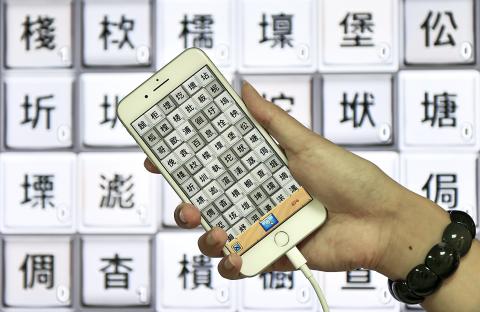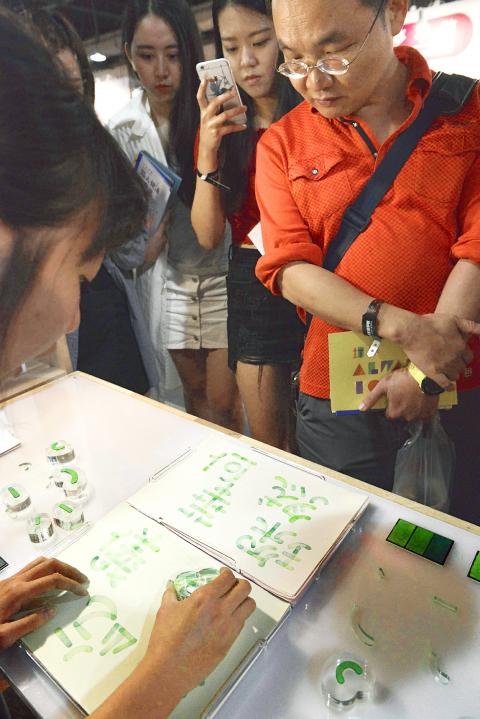As a growing number of people around the world learn simplified Chinese instead of the more complicated traditional characters, young creatives in Taiwan are fighting to promote what they fear will become a dying art. Introduced by the Chinese Communist Party in the 1950s to boost literacy, the simplified version of the script uses fewer strokes and is now the predominant writing system in China.
Foreigners learning Chinese also tend to be taught the simplified characters, used in official documents by international organizations including the UN. Even in Taiwan, where most people still use traditional characters, there is a growing tendency to opt for the more convenient simplified script.
And with an increasing number of the nation’s young people pursuing higher education and careers in China, the influence of the simplified system is expanding.

Photo: AFP
Creators of a new Taiwanese app game called Zihun (字魂) hope to help stem the tide. Players assume the identities of literary figures from ancient China and compete on speed and accuracy in writing traditional characters.
From filling in the blanks to “word solitaire” — using the last word of a phrase to create a new one — or matching simplified characters with their traditional version, players write the answers on their smartphone screens with their fingers or touch pens.
“We see Taiwan as the sole place to pass on traditional Chinese characters,” says Kevin Ruan, chief executive of tech firm Whale Party, which developed the app with Soochow University. “We hope the app reflects the cultural implications of the script.”

Photo: AFP
Predictive and voice activated messaging on smartphones is one of the reasons traditional characters are under threat, he adds, but says the initial reaction to the app has been encouraging — over 5,000 people have downloaded a trial version ahead of the official launch next month.
WORDS WITHIN WORDS
Traditional Chinese script is a mixture of pictograph characters that represent objects, and ideographs that depict ideas or concepts. Different or the same characters can form a compound word — the word “forest” consists of three “wood” characters, for example.

Photo: AFP
There are rules to the formation of most characters but learning to write them depends heavily on memorization. Critics say the simplified characters lose some of the meaning of the traditional versions.
One commonly cited example is the character “love,” which contains the word “heart” in the traditional form, but not in the simplified version.
“Traditional characters have allusions and meanings behind them and they reflect the imagination of ancient people. It’s a big loss that such elements are taken out,” said Jung Jeng-dau (鍾正道), head of the Chinese-language department at Soochow University in Taipei.
The use of simplified or traditional Chinese has also become politically loaded in recent years.
In Hong Kong, where traditional characters still dominate, some see the promotion of the simplified version as symbolic of an assertive China as it tightens its grip on the territory.
There are similar sentiments in Taiwan.
AESTHETIC SCRIPT
But for many, the bottom line is pragmatism.
Young Taiwanese design duo Wang Man-lin (王蔓霖) and Wang Chieh-ying (王介盈) hope their latest invention will make traditional characters easier to learn and fun to use.
Their craft business lai zi na li (來字哪裡) which translates as “where is the origin of words?” promotes the complex script and a new set of six stamps, embossed with lines and strokes, can together create all traditional Chinese words. Many customers are Chinese-language teachers or handicraft fans who like using the stamps to write greeting cards or postcards, Wang Man-lin said.
“Traditional Chinese is considered the most beautiful writing system in the world,” she said.
“We want to offer another way to learn it because writing traditional characters by hand is really difficult for non-native people.” The stamp set has been available for online pre-ordering since September and sales are more than 10 times their original estimate, at over US$66,500, said Wang, including orders from China, Malaysia and Canada.
Lin Chen-ling, 40, was among the crowd trying out the stamps at an educational fair in Taipei last month and said the set would make the process of learning traditional characters “more interesting and interactive” for her four-year-old son.
Some young Taiwanese at the fair also pledged to persevere with traditional script.
“I never write simplified characters because traditional characters look prettier and more cultured,” said 17-year-old student Chang Yao-shui.
“I hope they won’t vanish in future.”

On April 26, The Lancet published a letter from two doctors at Taichung-based China Medical University Hospital (CMUH) warning that “Taiwan’s Health Care System is on the Brink of Collapse.” The authors said that “Years of policy inaction and mismanagement of resources have led to the National Health Insurance system operating under unsustainable conditions.” The pushback was immediate. Errors in the paper were quickly identified and publicized, to discredit the authors (the hospital apologized). CNA reported that CMUH said the letter described Taiwan in 2021 as having 62 nurses per 10,000 people, when the correct number was 78 nurses per 10,000

As we live longer, our risk of cognitive impairment is increasing. How can we delay the onset of symptoms? Do we have to give up every indulgence or can small changes make a difference? We asked neurologists for tips on how to keep our brains healthy for life. TAKE CARE OF YOUR HEALTH “All of the sensible things that apply to bodily health apply to brain health,” says Suzanne O’Sullivan, a consultant in neurology at the National Hospital for Neurology and Neurosurgery in London, and the author of The Age of Diagnosis. “When you’re 20, you can get away with absolute

May 5 to May 11 What started out as friction between Taiwanese students at Taichung First High School and a Japanese head cook escalated dramatically over the first two weeks of May 1927. It began on April 30 when the cook’s wife knew that lotus starch used in that night’s dinner had rat feces in it, but failed to inform staff until the meal was already prepared. The students believed that her silence was intentional, and filed a complaint. The school’s Japanese administrators sided with the cook’s family, dismissing the students as troublemakers and clamping down on their freedoms — with

As Donald Trump’s executive order in March led to the shuttering of Voice of America (VOA) — the global broadcaster whose roots date back to the fight against Nazi propaganda — he quickly attracted support from figures not used to aligning themselves with any US administration. Trump had ordered the US Agency for Global Media, the federal agency that funds VOA and other groups promoting independent journalism overseas, to be “eliminated to the maximum extent consistent with applicable law.” The decision suddenly halted programming in 49 languages to more than 425 million people. In Moscow, Margarita Simonyan, the hardline editor-in-chief of the